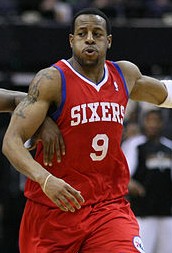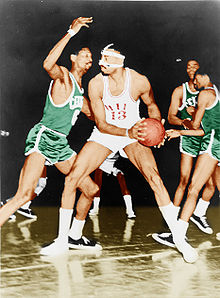 Wednesday was my 16th wedding anniversary.
Wednesday was my 16th wedding anniversary.
It also was the 30th anniversary of one of the most anticipated playoff games in NBA history – Game 7 of the Eastern Conference finals between the Philadelphia 76ers and the Boston Celtics.
The rivals met in the conference finals in three consecutive years from 1980-82. In 1981, the Sixers opened a 3-1 lead before the Celtics won the next three games by a combined five points. The following year, the Sixers again opened a 3-1 lead before the Celtics won Games 5 and 6 to force Game 7 on their home floor.
Celtics fans coined two crowd chants in that series. The first was “See You Sunday,” which they began at the end of a Game 5 home win. They were telling the Sixers that they would be back in Boston after losing Game 6 at home, just as they had done the previous year. And they were right.
No one gave the Sixers a chance to win that game. To paraphrase Sixers reserve forward Mike Bantom, there were 12 people in Boston Garden who believed the Sixers could win, and they were all in the visiting locker room.
There were actually at least 13, because I was in the building – fourth row, center court; thanks, Dad – and thought the Sixers could win, even after a half-dozen fans wearing sheets that said, “Ghosts of Celtics Past” paraded around the court just before tip-off.
Andrew Toney scored 34 points, cementing his reputation as “The Boston Strangler.” Julius Erving added 29, outplaying Larry Bird. And the Sixers won, 120-106, to advance to the NBA Finals and face the Los Angeles Lakers.
With about a minute remaining and the outcome no longer in doubt, Celtics fans acknowledged defeat by chanting, “Beat LA!” That is where the phrase began. When asked about the chant afterward, Erving said, “It was nice. But it wasn’t as loud as ‘See you Sunday.'”
And now, 30 years later, these rivals will play another Game 7 in Boston that will add to their storied history. The Sixers saw to that, calling on some of their own history with an ugly but spirited 82-75 home win in Game 6 that sets up Saturday’s showdown.
From John Smallwood of the Philadelphia Daily News: “These were the type of moments that made Allen Iverson a legend in Philadelphia – season on the line, odds all against you, desperate situation. I guess it was only fitting that Wednesday was the night that Sixers management persuaded Iverson to come home. If ever the Sixers needed the kind of inspiration that Iverson provided for a decade in South Philadelphia, it was Game 6 of the Eastern Conference semifinals, trailing the Boston Celtics, 3-2. I’m not really the metaphysical type. Wearing a Lou Williams No. 23 jersey and a red Sixers Liberty Bell hat sideways, Iverson looked every bit like a guy who hadn’t played in an NBA game since February 2010. He looked like a shell of his former self. Iverson’s presence provided a little extra juice to the Wells Fargo Center, but The Answer to the Sixers’ hopes of staying alive in the playoffs was not sitting next to chief executive officer Adam Aron in the stands. There was nothing magical about his appearance, nothing more than a legend coming home to provide a bit of support. Still, there was something Iversonesque about the Sixers’ effort in a must-win situation to push this to limit, to a Game 7. They played hard – Iverson hard. They played like it was their last game, which it could have been for the 2011-12 season. It wasn’t pretty. It wasn’t neat. It wasn’t perfect. But it was all heart, dug deep from that reserve in the Wells Fargo Center that Iverson always seemed to tap into. To be honest, it’s the way that these surprising Sixers had played all season. It just seemed a bit more pronounced with Iverson in the house. Who knows? Perhaps the next all-expenses trip the Sixers pay for will bring Iverson to Boston on Saturday, because that’s where the Sixers will be after their 82-75 victory. Now this series that was supposed to be an easy walk for the Celtics into the Eastern Conference finals comes down to a winner-take-all Game 7. Sure, the Celtics will be favored. They will be at home and this is a situation with which they have plenty of experience. But this is the last thing they wanted to see. They didn’t want to have a Game 7 against a scrappy Sixers team that has shown game after game that it doesn’t matter that it doesn’t know what it isn’t supposed to know. The Sixers didn’t know they weren’t supposed to be able to win in Boston, but they already did that in Game 2. The Sixers didn’t know that they weren’t supposed to fight through a close-out game against a savvy, veteran squad with a core that has an NBA championship in its pocket. But that’s what they did on Wednesday. We all know what they aren’t supposed to know for Game 7. We also know that doesn’t matter. “Game 7s are what they are,” said Boston coach Doc Rivers. “It’s nice to have it at home, but you still have to go get it.”
The Sixers got 20 points from Jrue Holiday, 12 apiece from Andre Iguodala and Evan Turner and 11 from Lou Williams. Four wing players, all in double figures, all of whom had things just a bit easier because the Celtics look too old and banged up to stay in front of them.
Ray Allen is hobbling on painful bone spurs in his ankle, which is affecting him on both ends of the floor. He was benched for defensive purposes for a portion of the fourth quarter, then missed a 3-pointer in the final minute that was really Boston’s last gasp. Avery Bradley, a solid on-ball defender, missed his second straight game with a shoulder separation and likely is done for the season. So the Sixers took full advantage.
From Dan Duggan of the Boston Herald: “Doug Collins told a lie last night before Game 6 of the Eastern Conference semifinals against the Celtics. The Philadelphia 76ers coach said there was no advantage for his team to exploit with Celtics defensive wizard Avery Bradley sidelined with a shoulder injury. The way the Sixers attacked in their 82-75 win made a liar of their coach. Philly’s trio of guards — Jrue Holiday (20 points), Evan Turner (12) and Lou Williams (11) — blew past the Celtics perimeter defenders all night. Collins identified points in the paint as a key stat in his pregame interview session and the Sixers held a 42-16 advantage in that category. But the close range baskets weren’t the result of Philly pounding the ball inside. Of the combined 17 field goals for the backcourt trio, 14 came on drives to the basket. “We just wanted to be aggressive, especially in the second half,” Williams said. “We saw where the high screen-and-roll was working for us. We realized we had some mismatches and we wanted to exploit them and we had success with it.” The pick-and-roll change was a counter to an adjustment the Celtics made earlier in the series. In Game 3, the Celts effectively began forcing Philly’s pick-and-rolls to the sideline. After watching film, Collins made the wise decision to attack with the pick set in the center of the floor. “It was tough for them to trap us on the side of the court. You trap in the middle of the court, you’ve got options,” small forward Andre Iguodala said. “You can go to the left side or the right side and you can swing the ball across the court. Whereas if you get trapped on that one side in the corner, there’s only one or two places you can go and those are high-risk passes that you’re making out of the corner.” Still, the adjustment might not have been as successful if Bradley had been in the lineup. The guard is likely done for the postseason, which means the Celtics can expect to see a similar Philly approach in Saturday’s Game 7 at the Garden.”
The Sixers also played outstanding team defense, which they have done all season but has been overlooked in this postseason. They were third in points allowed (89.4 ppg) and opponents’ field-goal percentage (.427) despite the absence of a true rim protector. In the playoffs, they have allowed 85 points or less in half their 12 games and 88.2 points per game overall while holding foes to 44 percent shooting.
And on Wednesday, they put the clamps on Rajon Rondo, who may have been torn between creating offense for himself and his teammates. Rondo managed nine points – his second-lowest total of the postseason – and a playoff-low six assists while taking foolish gambles on defense that helped the Sixers get shots at the basket.
From Ron Borges of the Boston Herald: “For all the problems their ailments have caused the Celtics, up until last night the one constant had been the smallest man on the floor. With Pierce’s left knee aching, Allen’s swollen ankle robbing him of his lift and Avery Bradley’s shoulders feeling the way Matt Light [stats]’s usually do around Nov. 15, Rondo had been often dominating and almost always comforting. Last night he was neither, going 4-of-14 from the field, taking only two foul shots because he didn’t attack the basket and, most damning of both his own play and his team’s, had only six assists, which is less than half his playoff average. That performance played perfectly into what Sixers coach Doug Collins said before the game he hoped to achieve. He wanted Rondo shooting more and passing less and he got what he wanted, although it’s difficult to know on a night when the Celtics shot 33 percent how much of that was the Sixers defense’s doing and how much what the Celtics were not doing. “I think he’s a passer first,” Collins said of Rondo. “He can get into the paint any time he wants, but I think he really wants to pass (first). The numbers on him show when he scores more than he assists their record is not as good. Last game he had five assists in the first half and we led by three. He had nine in the second half and you saw what happened.” Statistically, Game 5 was far from Rondo’s greatest night despite the 16-point victory, but it was the kind of night Rivers craves because Rondo was both a facilitator and director, running the Celtics offense rather than being just a high-scoring part of it. Last night he was neither.”
So the Celtics and Sixers and go to another Game 7, the sixth all-time between the clubs.
The Celtics won in 1965, escaping with a 110-109 home win en route to their seventh of eight straight titles. They won again in 1968, erasing a 3-1 deficit and dethroning the champs with a win in Philly. And they won in 1981, when Sixers GM Pat Williams was taking congratulatory handshakes at the end of Game 5.
The Sixers won in 1977, dethroning the aging defending champs with a home win fueled by Lloyd Free, known as “The Prince of Mid-Air” before legally changing his name to World B. Free. They also won in 1982, when before tip-off I shook hands with Red Auerbach with my right hand and gave his organization a Sicilian curse with my left.
Sixers-Celtics. Game 7. This is the way it’s supposed to be.
From Marcus Hayes of the Philadelphia Daily News: “Elton Brand strode through the corridors of TD Garden dressed like a stockbroker, as amiable as a preacher. A security guard congratulated Brand on his exceptional effort in a losing cause. “Thanks,” said Brand. “See you Saturday.”